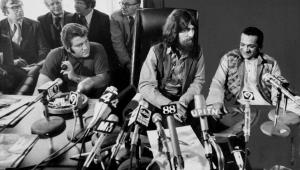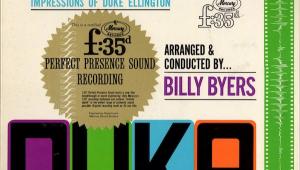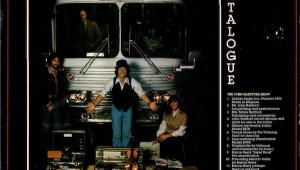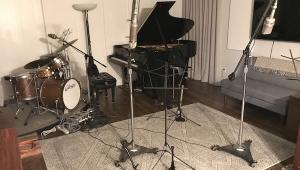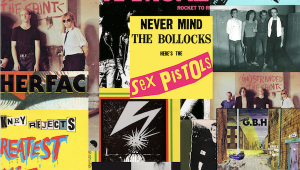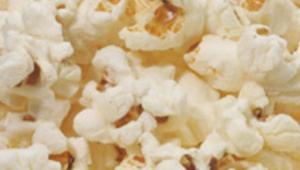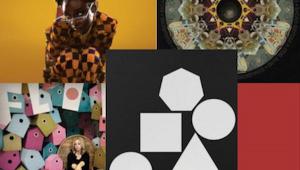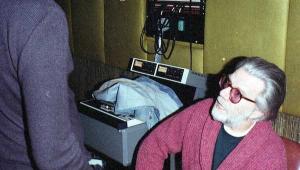Los Lobos On Record (through 1997)
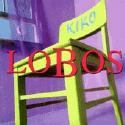
Los Lobos On Record
This survey omits the group's first independent release (1978), and the La Bamba Original Motion Picture Soundtrack (1987)
(Album covers can be found in the Photo Gallery, accessible below the picture of the site mascot, Mr. Eno).
LOS LOBOS:
and a time to dance
Produced by T Bone Burnett and Steve Berlin
Engineered by Mark Linett
No mastering credit
Slash 239631-1
Music: 7
Sound: 7
An aptly titled seven song EP on Slash Records (distributed by Warner Brothers) containing three Hidalgo/Perez originals, one by Rosas, two traditional tunes, and Ritchie Valens' "Come On Let's Go." That these guys could play was evident from the snappy opener, "Let's Say Goodnight" and the breakneck paced "Walking Song." Hidalgo's creamy, high pitched vocals announced an original voice as did Rosas' Les Paul-like guitar on "Walking Song" . "Anselma" a traditional Mexican two step with accordian accompaniment won a surprise Grammy for "Best Mexican-American Performance." An impressive "roots/rock" calling card, but who could have guessed what would come a decade later?
LOS LOBOS:
How Will The Wolf Survive?
Produced by T-Bone Burnett and Steve Berlin
Engineered by Mark Linett
Mastered by Stephen Marcussen at Precision Lacquer
Slash/Warner Brothers 25177-1 LP/ -2 CD
Music: 9
Sound: 8
How Will The Wolf Survive (1984) established Los Lobos as one of America's most formidable and eclectic bands, one which could rock hard on one track yet play it tender and sensitive on the next. The record opens with the ferocious Rosas/Perez Tex-Mex, rockabilly tinged "Don't Worry Baby," and follows with the Hidalgo/Perez penned "A Matter of Time," a tender story about the plight of migrant workers, which manages to both glide and swing thanks to Hidalgo's plaintive vocals and a double timed bridge. It's the first of many early tracks on which the group's blend of blues, soul and rock sounds uncannily like Van Morrison and company.
The group executes another breakneck Mexican two step and then digs into the honky tonk Bakersfield country sound of "Our Last Night," complete with pedal steel guitar, followed by "The Breakdown," a heavily syncopated Crescent City stew stirred with Berlin's funky sax. And that's just side one!
Side two opens with "I Got Loaded," a raucous cover, and continues with a mix of traditional Mexican music and "roots rock," culminating in the stunning title tune- an allegory about Hispanic tradition and culture in America.
With Hidalgo's tender yet gritty vocals, a stunning, eclectic mix of acoustic and electric instruments, and a skillful blend of American rock, blues and Mexican roots played with integrity by a band of virtuosic musicians, How Will The Wolf Survive? is an honest musical statement that maintains its power more than a decade after its release.
Sonically, it's a good eighties multitrack studio job, with nicely rendered acoustic instruments, and a minimum of audible processing dreck. While the CD transfer is accomplished, and doesn't suffer from a bright edgy acoustic, the LP is more transparent and spacious and should be easily available.
LOS LOBOS:
By The Light of The Moon
Produced by T-Bone Burnett and Los Lobos
Engineered by Larry Hirsch
Mastered by Bernie Grundman
Slash/Warner Brothers 9 25523-1 LP/2 CD
Music: 10
Sound: 9
The music and lyrics fuse on the album opener, the Hidalgo/Perez penned "One Time One Night," to provide the listener with a picture glass window view of the soul of Los Lobos. The song is an American musical landscape bouyed by optimism but grounded in a darker reality. Told in a series of four line vignettes, these are stories of limitless potential stymied by unfortunate circumstances: an abduction, a shooting, a car accident. But underlying them all is the promise of America. A promise expressed with a graceful, gentle melody.
The band turns 180 degrees towards darkness on the next two tunes, Rosas'/Burnett's "Shakin' Shakin' Shakes" which uses an earthquake metaphor, and the uncharacteristically bitter Hidalgo/Perez song "Is This All There Is," which, with lines like "Fifteen years on a sewing machine Where twisted hands don't mean a thing," offers an unsettling view of immigrants' vain search for the American dream.
The sides rounds out with "Prenda Del Alma," a traditional Mexican tune and "All I Wanted To do Was Dance," a New Orleans Zydeco style shuffle.
Burnett and company are basically following the same mix and match formula they set down on How Will The Wolf Survive?. Side two begins with Rosas' catchy Motown/Morrison styled "Set Me Free (Rosa Lee)" and continues with some tuneful and thoughtful folk/rock numbers, which while well crafted, indicate a band and a producer marching in place.
Not an essential Los Lobos album but a worthwhile one nonetheless. Sonically, the vinyl version is a big step down from How Will The Wolf Survive? , mostly because it has a hard, spitty, edgy sheen- especially on side one. 1987? I figure the LP was haphazardly cut from a 1610 digital master of a good sounding analog recording by the usually excellent Larry Hirsch.
The CD, with its warmer, though opaque overall balance, is actually preferable to the vinyl in some ways, though it posts that obnoxious, absurd warning: "The music on this Compact Disc was originally recorded on analog equipment. We have attempted to preserve as closely as possible the sound of the original recording. Because of it's high resolution (!!!!), however, the Compact Disc can reveal limitations of the source tape." Gag me with a brickwall filter!
LOS LOBOS:
La Pistola Y El Corazón
Produced by Los Lobos
Engineered by Larry Hirsch
Mastered by Stephen Marcussen
Slash/Warner Brothers 9 25790-1 LP/-2CD
Music: 9
Sound: 10
Around the time By The Light of The Moon was issued, Los Lobos hit big with "La Bamba." After a hectic tour, and with the commercial pressures of the Ritchie Valens tune building, Los Lobos retreated to Rosas' house to polish up some traditional and popular Mexican tunes- the group's real roots. The result was this charming, enjoyable and passionate set recorded in a five day stretch at L.A.'s Sunset Sound Factory.
It is almost impossible to recognize the rock band that recorded How Will The Wolf Survive? and
The variety of unusual acoustic instruments are a feast for the ears as recorded with rich, natural clarity by Larry Hirsch. Here's where the sonic calamity that is 16 bit 44.1K digital demonstrates itself with depressing clarity. "Limitations of the source tape?" "LIMITATIONS OF THE SOURCE TAPE?"
How about limitations of an inadequate, primitive digital medium which cuts music off at the knees? Just compare the two formats and you tell me which has higher resolution, which expresses the small gestures which make music live, and which kills it off, leaving a dead, but pristine shell? The vinyl sings, making the stringed instruments sound real, with hollow bodies and ringing overtones. The CD sounds like everything's been damped down with rubber cement.
LOS LOBOS:
The Neighborhood
Produced by Larry Hirsch and Los Lobos
Engineered by Larry Hirsch
Mastered by Stephen Marcussen
Slash/Warner Brothers 26131-1 LP/-2CD
Music: 10
Sound: 11
On this 1990 release, Los Lobos buries some of its roots and creates an assimilated, rocking record, with rhythm assists from Jerry Marrota and Jim Keltner. The Hidalgo/Perez team comes up with its most assured, varied and majestic songs yet, from the foreboding "Down By the Riverbed (with John Hiatt on backing vocals)," to the stark, bitter blues of "I Walk Alone," to the uplifting "Emily," and the tender "Little John of God (sung by Levon Helm)." Side one ends with a hard rocking cover of "Georgia Slop," driven home by Steve Berlin's great baritone sax blasts.
The pounding medium tempo rhythms restrict the band's nimbleness somewhat, but they also give Rosas plenty of uncluttered space to do some nifty fingering- especially on "I Can't Understand" which he co-wrote with blues legend Willie Dixon, and on the title tune. The arrangements and production sophistication demonstrate that the band has learned to distinguish between making music for the stage and for record.
Thanks to Larry Hirsch's brilliant engineering job, The Neighborhood is clearly Los Lobos' most natural sounding record, with outstanding top and bottom extension, a big soundstage, with a nicely rendered ambient bed, and solid, focused images. You can hear a hint of what's to come on "Angel Dance," recorded and produced by Tchad Blake and Mitchell Froom. Their penchant for processing is clear, resulting in a somewhat constricted, low ceiling sound. Definitely worth seeking out on the AAA vinyl, mastered by Stephen Marcussen, though the CD isn't bad. Just don't expect the big picture, wet ambient soundstage, shimmering string sound, or the tight, extended bass.
LOS LOBOS:
Kiko
Produced by Mitchell Froom and Los Lobos
Engineered by Tchad Blake, others
Mastered by Bob Ludwig
Slash/Warner Brothers 9 26786-2 CD
Music: 11
Sound: 10
Nothing Los Lobos recorded previous to Kiko could have prepared anyone for this piece of sustained, surreal brilliance. Dreamlike sonic vistas, ominous lyrical horizons, mysterious musical crevices, and spring-like rhythmic compressions and extensions combine to create a dayglo, funhouse-like environment filled with familiar, but oddly drawn musical elements.
The chill inducing title tune, with its creepy, slinky rhythm, its haunted saxophones, its "lavender moon" and "big black cat," is a self contained macabre vision more powerful than any MTV video. And yet, beneath the daring musical invention is a strangely familiar bedrock of musical Americana. There's swing jazz, blues, rock and all of the other roots- including the group's ethnic ones, but they've been strangely, and wonderfully twisted.
If you hear The Band poking around the musical corner it is not a coincidence. Hidalgo and Perez traveled to Woodstock to help the group write songs before starting on this album. "Two Janes" sounds oddly familiar- like The Band's cover of "The Long Black Veil." If any Band album sows the seeds of Kiko it's Stagefright which contains the mystical "Daniel and The Sacred Harp"- one of the group's more magical songs. But the influences range far and wide- intentional or otherwise, which is part of the album's fascination. Listen to "Just A Man" and you'll hear the Robin Trower edition of Procol Harum.
The Hidalgo/Perez team comes up with its most affecting, tender yet tough batch of tuneful songs like "Short Side of Nothing," and Cesar Rosas turns up the heat with the gritty "That Train Don't Stop Here Anymore," and the hardscrapple "Wicked Rain."
The playing is intense, the rhythms relentless, the musical choices breathtakingly fresh, and Froom and Blake brush with irridescent paint on a black velvet canvas achieving a perfect subject/object match. While not much sounds "real" in the natural sense, the sonic picture is smooth and clean, with outstanding bass extension and definition. Overall clarity is superb, the mix is masterful, and the overall spectrum balance is ideal, though the top end sounds tucked and rolled as intended. A British vinyl edition on London records (pressed in Holland) features steroid like bass and is to be avoided. The ADD CD is the way to go. One of the greatest popular music albums ever made. A masterpiece. Period.
Latin Playboys (Slash/Warner Brothers 9 45543-2 CD) a Kiko offshoot which teamed Hidalgo/Perez with Froom/Blake, offers an eclectic, experimental sound collage filled with samples, overdriven inputs and other sonic detritus which sound like they were swept from the floors of the Kiko sessions. Funky, minimalist fun.
LOS LOBOS:
Just Another Band From East L.A.- A Collection
Produced by Los Lobos
Various Engineers
Mastered by Dave Collins
Slash/Warner Brothers 9 45367-2/4
Music: 10
Sound: 10
An indespensible, attractively packaged two CD set (including a bound booklet and slipcase) released in 1993, containing highlights from the band's Slash/Warner Brothers catalog, plus rare fare: tracks from the band's first independent album also called Just Another Band From East L. A.,a few cuts from the "La Bamba" soundtrack, a few tracks from "The Wrong Man," a Showtime movie, the band's contribution to Hal Willner's Stay Awake: Various Interpretations of Music From Vintage Disney Films , and various live, previously unreleased recordings from throughout the band's career including versions of The Grateful Dead's "Bertha" and Cream's "Politician." There's also an outtake from The Neighborhood and an unreleased studio track. A fine sounding mastering job by Dave Collins adds to the set's luster.
LOS LOBOS:
Colossal Head
Produced by Mitchell Froom, Tchad Blake and Los Lobos
Engineered by Tchad Blake and John Paterno
Warner Brothers 9 46172-2 CD
Music: 10
Sound: 9
Written and recorded in one month due to a time crunch caused by the group's work on the "Desperado" soundtrack, Colossal Head, Los Lobos' latest album, and first for Warner Brothers, lacks Kiko 's writing and production polish, but more than makes up for it with its spontaneous, scorching, aggressive energy and deeply felt grooves, aided and abetted by Froom's and Blake's adventurous spirit.
The album is worth picking up just for the mambo/rock of "Mas Y Mas," a dazzling display of the band's raw power, including a supercharged, hyperdriven blues guitar solo and a great baritone sax foundation from Berlin. The whole thing is swathed in a caramel colored "Lo-Fi" soundbath that makes it sound as if you're listening from outside the front door of some small dive of a social club, or through a car AM radio. The guitar solo's reverb is set so it appears to be ricocheting off the alley walls of a tenement building.
In other words this is the Froom/Blake team at its most subjective and creative. You'll either appreciate their sound diddling, which includes lopping off the entire top end, or wish they'd get the fuck out of the way and record the sound of a band playing live. Not being a total purist, I like what they've done here.
While the sound is heavily produced, what you'll hear is what the band is capable of live. I heard them tear into "Mas Y Mas" and deliver it with all the power, drive and authority of the recorded version. Other aspects of the production would be more difficult to reproduce live, like on "Little Japan" where there's what sounds like a sample of a horse sneezing used as a percussive accent.
With its raunchy blues riffs, distorted guitars and vocals,Colossal Head sounds like Los Lobos Does Captain Beefheart and that's not a bad thing. It's a liberating, swaggering CD in which the band sheds its soundtrack studio tan, cools its intellect, and shakes its collective booty.
The only unfortunate note sounded on this set is the toy robot on the cover. Do you know how many CDs I've received over the past year with virtually the identical cover? Close to a dozen. Innovative music deserves innovative art, don't you think?
ORIGINAL SOUNDTRACK: Desperado
Original score produced by Los Lobos
Engineered by Bill Jackson and Cesar Rosas
Mixed by Bill Jackson and Steve Berlin
No mastering credit
Epic Soundtrax EK 67294 CD
Music: 8
Sound: 10
Never saw the movie, love the soundtrack though, which includes eight Los Lobos originals, and some repeats from others including a few from Latin Playboys a Dire Straights reissue, one from Link Wray, one from Santana and a few hot numbers from Tito and Tarantula whom I've never heard of. Not essential for everyone, but for Los Lobos "completists," it is. Plus the sound is outstanding-especially the Rosas recordings done at his home studio.






